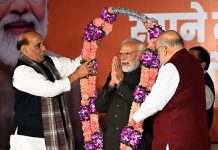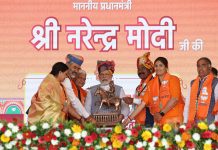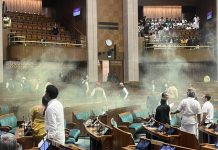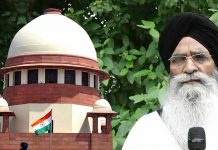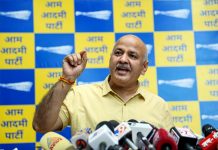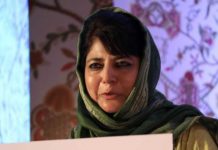 It rarely happens in the case of India and Pakistan that an achiever in any field is admired on both sides of the Radcliffe Line. But on February 11 the sudden death of Asma Jahangir, undoubtedly the bravest daughter of Pakistan, nay, of South Asia, was mourned in both countries by her numerous well-wishers and admirers. If she had a huge number of admirers in her own country, she had no fewer supporters in India for the causes dear to her.
It rarely happens in the case of India and Pakistan that an achiever in any field is admired on both sides of the Radcliffe Line. But on February 11 the sudden death of Asma Jahangir, undoubtedly the bravest daughter of Pakistan, nay, of South Asia, was mourned in both countries by her numerous well-wishers and admirers. If she had a huge number of admirers in her own country, she had no fewer supporters in India for the causes dear to her.
She fiercely fought for the protection of human rights and democratic values. She firmly stood against the military establishment’s interference in an elected government’s affairs, misuse of intelligence agencies to terrorise critics of the ruling dispensation, extremists victimising members of minorities in the name of religion and use of extremism as an instrument of foreign policy. Her popularity in India was also related to her drive for forging friendly relations between the two neighbours. Her disappearance from the scene has weakened the Indo-Pak peace constituency on the other side of the border.
Asma died all of a sudden at a time when nobody could think of her end being so near. No one knew that she was suffering from any heart-related ailment. There are no reports about Asma being a heart patient. Perhaps, she never had a proper medical check-up of her heart. But this is not surprising in the case of people like her who are so much preoccupied with the causes dear to them that they have no time to take care of their health. She had a massive heart attack after agreeing to represent a minister in a case of contempt of court. She had promised former Prime Minister Nawaz Sharif on the phone that she was ready to fight the case, but she abruptly discontinued talking to a lawyer sitting with Nawaz Sharif at his Lahore house. This was quite disturbing as she was not known for behaving in this manner. That is why Nawaz Sharif tried to contact her at least 25 times but she did not respond. Someone else picked up her mobile to inform Sharif that Asma, 66, was no more. She had collapsed after having a cardiac arrest.
Soon her daughter Munizae Jahangir, a TV journalist, was on twitter with the sad message, “I am devastated @ loss of my mother Asma Jahangir. We shall B announcing date of funeral soon. We R waiting 4 our relatives 2 return 2 Lahore.”
In her 40-year-long illustrious career as the most admired human rights activist, she was the first woman in her country to acquire the position of the Pakistan Supreme Court Bar Association’s President.
She co-founded the Pakistan Human Rights Commission in 1987 and servedas its General Secretary till 1993 when she got the responsibility of heading it which she did with distinction. In fact, the commission owes its existence to her single-minded devotion to setting up an organisation to carry on the drive for protecting human rights, particularly of the minorities, forcefully and systematically.
Born in 1952 in Lahore, she acquired an LLB degree in 1978 from Punjab University and began practicing as a lawyer with clearly being focused on human rights. She had indomitable courage of conviction to be on the side of those either targeted by the government of the day or by extremists in their unjustifiable zeal as fake defenders of their religious beliefs. The minorities in Pakistan, as anywhere in the world, have been victimised on any pretext by the extremist fringe.
She was never afraid of defending the rights of such victims, sometimes even at the cost of jeopardising her own life. That she could muster enough courage to take on extremist elements was possible because of her undiluted commitment to providing succour to those being victimised only because they happened to belong to a different religion or sect. In her opinion, truth must be defended at any cost.
Asma had immeasurable love for democratic values for which she challenged even the ruthless military dictators like General Zia-ul-Haq and General Pervez Musharraf. She rejected any kind of sops offered by these rulers and criticised their rule openly, not bothering about the consequences.
She championed the cause of democracy during General Zia’s rule and enthusiastically took part in the popular march taken out at that time for the formation of an elected government. She got imprisoned in 1983 for her outspokenness against the military dictatorship, but she remained firmly committed to the fight for the restoration of democracy.
Equally vehemently, Asma fought for getting the sacked Chief Justice of Pakistan, Iftikhar Chaudhry, reinstated. A diminutive Asma could be seen on the forefront of the lawyers’ movement against the military dictatorship headed by General Musharraf. It was, therefore, not surprising that she was put behind bars in 2007 during the Musharraf regime.
When she was freed from captivity she alleged in 2012 that Pakistan’s intelligence network was after her blood. The spy agencies are solely responsible for the “missing persons” issue in Pakistan which she raised forcefully on every occasion that came her way.
She was never bothered about who was happy or unhappy because of her activities. Yet her admirers can be found in every section of society not only in Pakistan but all over South Asia. If she was the most vocal critic of the military establishment for derailing the elected government, she was also opposed to judicial activism, which, she believed, caused harm to the justice delivery system. That is why she criticised the Pakistan Supreme Court on many occasions. Asma found no justification for the apex court verdict disqualifying Nawaz Sharif to continue as Prime Minister in the famous Panama Papers case in July 2017.
She won many prestigious awards like the 2014 Right Livelihood Award, the 2010 Freedom Award, the 2010 Hilal-e-Imtiaz and the Sitara-e-Imtiaz in recognition of her work and could have got more such honours, but destiny had decided to close her file forever. A person like her, who would not hesitate in expressing her views against oppression of any kind, is now difficult to find in Pakistan.
As poet Iqbal said, “Hazaaron saal Nargis apni be-noori pe roti hai; bari mushkil se hota hai chaman mein deedawar paida”.
letters@tehelka.com

